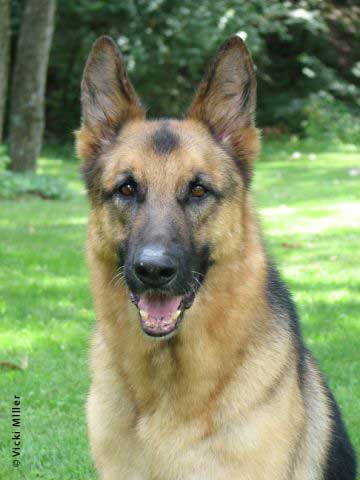Description
Degenerative Myelopathy is a debilitating disease that causes gradual paralysis in many dog breeds. It is caused by a degeneration of the spinal cord that onsets typically between 8 and 14 years of age. It presents first with the loss of coordination of the hind legs. It will typically worsen over six months to a year, resulting in paralysis of the hind legs. If signs progress for a longer period of time, loss of urinary and fecal continence may occur and eventually, weakness will develop in the front limbs. An important feature of Degenerative Myelopathy is that it is not a painful disease.
Research Available:
DM Research Publication in the Proceedings of the National Academy of Sciences: “Genome-wide association analysis reveals a SOD1 mutation in canine degenerative myelopathy that resembles amyotrophic lateral sclerosis”

Explanation of DNA Test Results
Normal
This dog is homozygous N/N for the mutation that is the most common cause of Degenerative Myelopathy, with two normal copies of the gene. Among the hundreds of dogs studied so far at the University of Missouri, only two dogs with test results of N/N (Normal) have been confirmed to have DM. The N/N (Normal) dog can only transmit the normal counterpart of the common mutation to its offspring, and it is unlikely that this dog or its offspring will ever develop DM.
Carrier (A/N)
This dog is heterozygous A/N, with one mutated copy of the gene and one normal copy of the gene, and is classified as a carrier. Carriers are far less likely to develop DM, but we have confirmed DM in a few carrier dogs. They may be used carefully in breeding programs to keep their good qualities while reducing the risk of DM in future generations.
At-Risk (A/A)
This dog is homozygous A/A, with two mutated copies of the gene, and is at risk of developing Degenerative Myelopathy (DM). Although almost all dogs in the research study with confirmed DM have had A/A DNA test results, recent evidence suggests that there are other causes of DM in some breeds. In addition, not all dogs testing as A/A have shown clinical signs of DM. DM is typically a late-onset disease, and dogs testing as A/A that are clinically normal may still begin to show signs of the disease as they age. Some dogs testing A/A did not begin to show clinical signs of DM until they were 15 years of age. Research is ongoing to estimate what percentage of dogs testing as A/A will develop DM within their lifespan. At this point, the mutation can only be interpreted as being at risk of developing DM within the animal’s life. For dogs showing clinical signs with a presumptive diagnosis of DM, affected (A/A) test results can be used as an additional tool to aid in the diagnosis of DM. Dogs testing At-Risk (A/A) can only pass the mutated gene on to their offspring.
Equivocal
An Equivocal test result indicates that the test results were inconclusive. This is typically the result of poor sample collection. When the test yields an equivocal result, a second punch will be taken from the FTA card and the test rerun. If the second test is still equivocal, the owner will be contacted and asked to submit a new sample.
Breed Testing
Although any dog can be tested for Degenerative Myelopathy, it is possible that the genetic background that predominates in some breeds prevents the development of symptoms even in dogs testing affected (at risk). At this time we are reluctant to recommend testing for members of breeds where the University of Missouri has not yet proven susceptibility to DM through microscopic examination of spinal cords from deceased dogs that exhibited symptoms of the disease. The required evidence of association between the genetic mutation and actual spinal cord evaluations has only been proven in the breeds listed:
- Airedale Terrier
- American Eskimo Dogs
- American Water Spaniel
- Australian Shepherd
- Bernese Mountain Dog
- Bloodhound
- Borzoi
- Boxers
- Boykin Spaniel
- Cardigan Welsh Corgi
- Cavalier King Charles Spaniel
- Chesapeake Bay Retrievers
- Collie
- English Springer Spaniel
- German Shepherd Dog
- Golden Retriever
- Glen of Imaal Terrier
- Jack Russell Terrer
- Kerry Blue Terriers
- Komondor
- Labrador Retriever
- Nova Scotia Duck Tolling Retriever
- Pembroke Welsh Corgis
- Poodle
- Pug
- Rhodesian Ridgeback
- Shetland Sheepdog
- Siberian Husky
- Soft Coated Wheaten Terriers
- Wire Fox Terrier
Guidelines for Breeding Dogs Who Are Carriers or At-Risk for Degenerative Myelopathy (DM)
Owners with dogs testing as Carriers (A/N), or At-Risk (A/A) are strongly encouraged to share these results with their attending veterinarian and seek genetic counseling when making breeding decisions.
The “A” (mutated) allele appears to be very common in some breeds. In these breeds, an overly aggressive breeding program to eliminate dogs testing A/A or A/N might be devastating to the breed as a whole because it would eliminate a large fraction of the high-quality dogs that would otherwise contribute desirable qualities to the breed. Nonetheless, DM should be taken seriously. It is a fatal disease with devastating consequences for the dog and can be a trying experience for the owners that care for them. A realistic approach when considering which dogs to select for breeding would be to treat the test results as one would treat any other undesirable trait or fault. Dogs testing At-Risk (A/A) should be considered to have a more serious fault than those testing as Carriers (A/N). Incorporating this information into their selection criteria, breeders can then proceed as conscientious breeders have always done: make their breeding selections based on all the dog’s strengths and all the dog’s faults. Using this approach and factoring the DM test results into the breeding decisions should reduce the prevalence of Degenerative Myelopathy in the subsequent generations while continuing to maintain and improve upon positive, sought-after traits.
We recommend that breeders take into consideration the DM test results as they plan their breeding programs; however, they should not over-emphasize the test results. Instead, the test result should be one factor among many in a balanced breeding program.
Tests are ordered online through the secure area of the OFA website. Payment is accepted by credit card (MasterCard and VISA). The OFA administers all order handling. Upon receipt of an order, the OFA will send out the test kit which will include a Foam-Tipped Applicator card for DNA sample collection, along with sample collection instructions. Using the FTA card technology, owners can safely collect DNA samples at home. The collection process is non-invasive, and no veterinary appointment is necessary.
Samples are then sent to the University of Missouri College of Veterinary Medicine where the samples will be processed by the Small Animal Molecular Genetics Lab. Results will be forwarded to the OFA, and the OFA will issue the resulting report to the owner.
The fee for each test includes the test kit, laboratory processing, and subsequent registration in the OFA databases.
